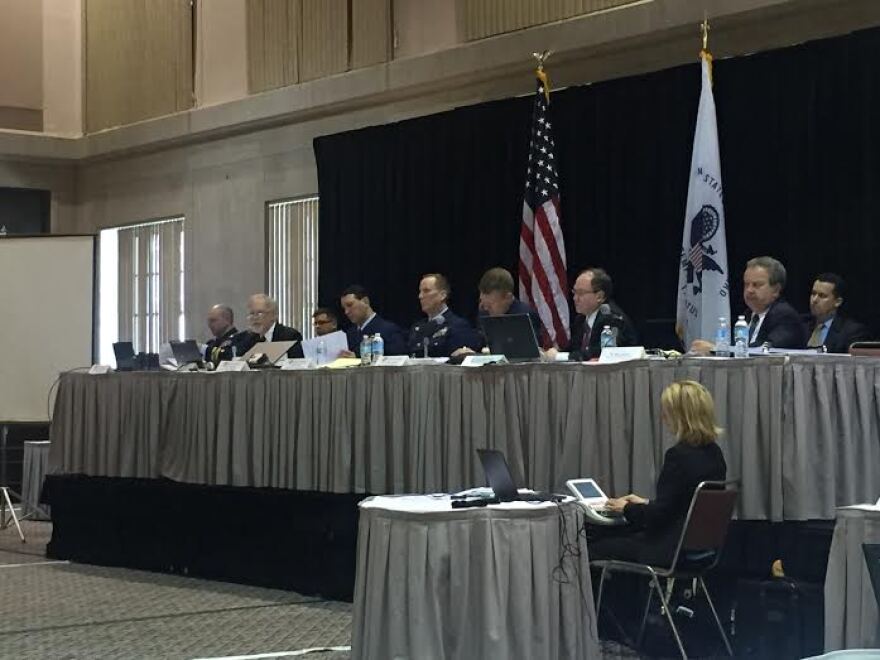Tuesday was the first day of a Coast Guard hearing into the sinking of the El Faro cargo ship. In Jacksonville, the Marine Board of Investigation focused on the relationship between the ship’s crew and its operator, TOTE Services.
One TOTE representative said El Faro’s captain was responsible for making the final decision to sail near the hurricane that sank it.
Tuesday began with a moment of silence for the victims. Crew members’ family cried in a ballroom at the Prime Osborne Convention Center. Then testimony focused on how the crew and captain worked with ship operator, TOTE Services.
During nine hours of testimony Tuesday, four major questions emerged:
Did TOTE Coerce El Faro’s Captain Into Sailing Near Hurricane Joaquin?
TOTE Vice President of Operations Philip Morrell testified that course decisions are ultimately up to the ship’s master—in this case, Capt. Michael Davidson.
“There’s a couple different routes you can take, and the master ultimately decides which route he’s taking based on his voyage plan,” Morrell said. “The normal one is what we call the Atlantic trip voyage, but there’s two other options they can take.”
Morrell says captains usually make changes to their voyage when there’s severe weather, and they’re required to notify TOTE the cargo will arrive late. But Davidson continued on the normal route despite a strengthening Hurricane Joaquin’s forming nearby. Still, it’s unclear what Davidson's final contact was with TOTE because the ship’s voice data recorder hasn’t yet been recovered.
Why Didn’t TOTE Send El Faro’s Captain Safety Alerts Regarding Joaquin?
When asked whether safety alerts were sent to the El Faro about the strengthening Hurricane Joaquin, TOTE’s Morrell simply replied, “No.” That’s despite a long trail of safety warnings regarding Hurricane Danny and Tropical Storm Erika last August. Morrell told investigators alternate routes are there mainly in case of severe weather.
“Usually the master is doing this for weather avoidance or a safer ride, so the expected on-time arrival would be not probably what is posted,” Morrell said.
The El Faro did reroute during Tropical Storm Erika, spending more time around the Bahamas than it otherwise would have. Morrell testified that in addition to the main route, the El Faro and its sister ship, the El Yunque, have two other options for getting from Jacksonville to San Juan, Puerto Rico.
Was The El Faro Properly Maintained?
The El Faro was originally built in 1975, making it one of the oldest ships in TOTE’s fleet. Coast Guard officials questioned Morrell about the ship’s 40-year history to try and determine how well it was maintained.
The El Faro was originally named the Northern Lights and was focused on trade between Washington state and Alaska. Then briefly, from 2003 to 2006, the ship was contracted by the U.S. military for running supplies from Texas to Kuwait for Operation Iraqi Freedom. Before its ill-fated trip in October, the ship was again slated to return to the Alaskan trade after dry-docking for repairs to its boilers.
Investigators asked Morrell why the aging vessel was in continuous use when TOTE had plenty of younger ships at its disposal. Morrell said it the reasoning was twofold: First, the ship was in no worse condition than its newer vessels, and, second, new environmental regulations would make it obsolete in four years anyway.
Morrell said the El Faro and its sister ship would fall under the Environmental Protection Agency’s “Emission Control Area Designation.” New EPA rules going into effect in 2020 would mean retrofitting the old ships to emit less greenhouse gasses or decommissioning them. Coast Guard officials asked Morrell if the new rule meant TOTE was trying to get the most out of faulty vessels before they shelved them.
But Morrell said the company had the intention of making the ships compliant and continuing to use them after the new rule’s implementation.
Why Wasn’t There A More Complete Employment Evaluation For Capt. Davidson?
During the course of the hearing Tuesday, Coast Guard investigators brought up TOTE emails that stated there was “dwindling confidence in the leadership” of El Faro Capt. Michael Davidson after a poor response to an interpersonal issue between crew members.
Morrell said he didn’t know much about the emails and didn’t have an answer for why there weren’t complete employment evaluations for Davidson in the last three years. Morrell also didn't comment on why Davidson was allowed to continue piloting the El Faro if those concerns existed and why weren’t these concerns taken higher up TOTE’s corporate chain.
The hearings will pick up Wednesday with more TOTE representatives and will assess safety protocols for the El Faro and TOTE’s other vessels.





